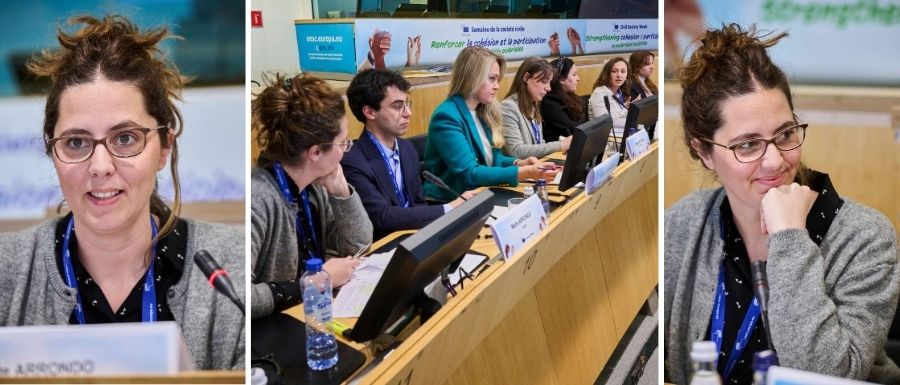At the Civil Society Week 2025, organised by the European Economic and Social Committee, housing took centre stage thanks to the impactful contribution of Maite Arrondo, member of ALDA’s Advisory Board and expert in innovation in housing policies. Representing ALDA’s long-standing commitment to inclusive democracy and local development, Arrondo called for a European approach to housing that is rooted in rights, social cohesion and the empowerment of local authorities.
During her speech, Arrondo highlighted that housing can be seen either as a human right or as a market commodity — depending on whether one views it through a legal or economic lens, and she urged the EU to rethink its policy and funding structures accordingly. With millions of citizens facing unaffordable rents or precarious living conditions, the current housing system is failing to deliver on its most basic function: providing people with homes.
One of her main recommendations was to ensure stronger EU investment in affordable and sustainable housing through the next Multiannual Financial Framework (2028–2034). This includes allocating targeted resources in the Social Climate Fund to support energy-efficient and inclusive housing models. Crucially, she proposed removing housing from speculative markets and linking future investment to long-term affordability, as well as introducing a Real Estate Transparency Register at EU level to combat tax evasion and financial crime in the housing sector.
Arrondo highlighted the need to rebalance the financial and rights dimensions of housing, proposing that indicators on housing affordability and exclusion be integrated into the European Semester process. Monitoring these indicators would help the EU respond more effectively to growing socio-economic inequalities across Member States.
“We must rebalance the financial and rights dimensions of housing to meet the urgent needs of Europe’s most vulnerable citizens.”
In line with ALDA’s vision for inclusive governance, the intervention placed particular emphasis on local authorities as key actors in the delivery of housing solutions. Arrondo called on the EU to channel funds directly to cities and municipalities, accompanied by technical guidance and the exchange of best practices. Housing policies, she argued, should involve cross-sector partnerships among local governments, civil society, small businesses, housing associations, and tenant unions.
To enhance social cohesion, the EU must promote mixed-income and intergenerational housing, placing the needs of vulnerable populations — such as migrants, elderly residents, and low-income households — at the heart of housing strategies. These principles are in line with ALDA’s broader commitment to inclusive local democracy and participatory decision-making.
Arrondo also proposed the creation of a European Collaborative Housing Fund to support community-led and cooperative models. These alternatives — such as Community Land Trusts and housing cooperatives — not only increase housing availability but also promote democratic ownership and strengthen local economies. A recent success story from Spain, where the Council of Europe Development Bank financed over 350 cooperative homes in Catalonia, served as a concrete example of what such a fund could achieve.
Addressing the issue of homelessness, Arrondo advocated for sustained EU support to the EU Platform on Combatting Homelessness (EPOCH) and for the expansion of the Housing First model. She stressed the importance of data-driven monitoring frameworks, referencing the OECD’s recent work on measuring homelessness to develop evidence-based policies and fill data gaps, particularly concerning hidden populations.
By combining rights-based principles with territorial cohesion and local engagement, Maite Arrondo’s recommendations align with ALDA’s belief that inclusive housing is essential for democratic resilience and community well-being.
“Many houses are not serving their primary objective — providing homes for people.” This was the closing reflection of a powerful intervention, and a timely reminder for policymakers. As the EU discusses its Affordable Housing Initiative, ALDA echoes the call for policies that prioritise people over profit — and that give cities and citizens the tools to shape their own housing future.
➡️ Discover more about ALDA’s engagement in the Civil Society Week 2025: alda-europe.eu/alda-at-civil-society-week-2025
© PHOTO CREDITS: All Rights Reserved – EESC
